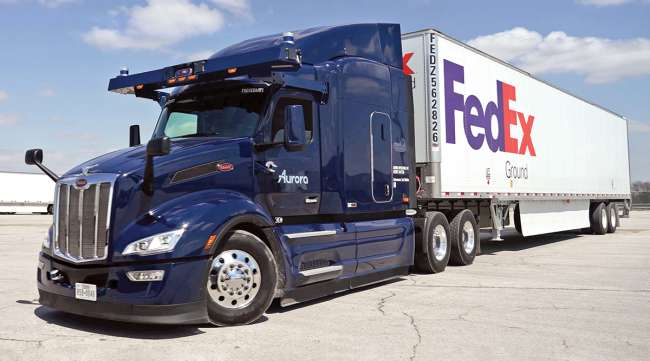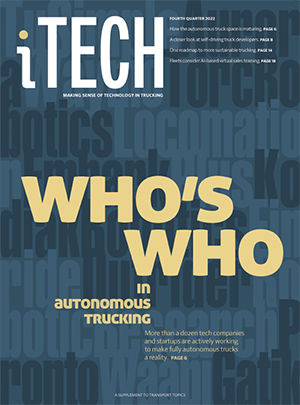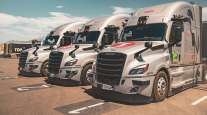The Sacramento Bee
Self-Driving Trucks Need Human Operator Under California Bill

[Stay on top of transportation news: Get TTNews in your inbox.]
California lawmakers are moving forward with plans to restrict the deployment of self-driving trucks — a move that industry representatives say is misguided.
“Rather than doing the responsible thing and waiting to see what a co-equal branch of government is doing, (legislators) are stepping in the middle and lighting a stick of dynamite,” said Jeff Farrah, executive director of the Autonomous Vehicle Industry Association.
California assembly members on May 31 overwhelmingly voted to pass Assembly Bill 316, a proposal with bipartisan support to require a trained individual to sit behind the wheel of autonomous semitrucks and big rigs.
The legislation, which will need to pass the Senate and get signed by Gov. Gavin Newsom before it becomes law, is part of a larger national conversation around the risks of automation and artificial intelligence. It is shaping up to become one of the marquee fights between lawmakers and technology companies this legislative session.
“Let’s face it. There are a lot of people in Big Tech lobbying against this bill, and you know they have the ear of the governor and his staff,” said the bill’s author, Assemblymember Cecilia Aguiar-Curry (D-Winters). “But we need to make sure that the roads are safe for the sake of our constituents and that jobs are safe for our truck drivers.”

Who's Who in the Autonomous Space
►Overview of Self-Driving Truck Development
Company Sketches
Click the links to jump to profiles of autonomous companies.
Aurora | Waymo | TuSimple | Gatik | Locomation | Torc Robotics | Waabi | Einride | Plus | Embark | Kodiak Robotics | Robotic Research | Outrider | Pronto
As written, the bill essentially intervenes in a public rulemaking process underway in the California Department of Motor Vehicles, which administers the state’s autonomous vehicles program and issues permits to manufacturers for testing and deployment.
Current state law, established by the DMV, allows testing and deployment of driverless light-duty autonomous vehicles that weigh 10,000 pounds or less — stopping short of allowing the same for longhaul trucks and big rigs with autonomous capabilities.
Aguiar-Curry’s bill would not stop the DMV from permitting the testing of autonomous heavy-duty trucks but would mandate that the trucks always have a human operator.
Assemblymember Laura Friedman (D-Glendale), who voted in support, said she had “not been impressed” with the DMV’s actions around autonomous vehicles up to this point.
“Unfortunately, the DMV has failed to keep track of problems that are occurring right now with the autonomous vehicles that are on the road,” Friedman said, pointing to cars shutting down in the middle of streets and on transit tracks, or trying to flee police.

Friedman
“The fact of the matter is, if a human was driving like some of these vehicles, they probably would have had their license suspended by now.”
Proponents of AB 316 include San Francisco Mayor London Breed and U.S. Reps. Barbara Lee, Katie Porter and Adam Schiff. The California Labor Federation and International Brotherhood of Teamsters, which represents truck drivers across the state, was also integral to the crafting of the bill.
Supporters say the regulation would help protect people traveling on California roadways and support the livelihoods of truck drivers across the state.
“In our view, autonomous vehicles are a direct threat to good, middle-class jobs,” said Peter Finn, western region vice president for the Teamsters. “The purpose of why these autonomous vehicles are being created and why big corporations want to use this technology is for one reason only — and that’s to cut their labor costs.”

Finn
Opponents of the legislation say it’s an overreach that fails to improve driving conditions on California roads.
Driverless semis are already on the roads in a handful of states, including Arkansas, Nevada and Texas. The autonomous driving software company Aurora has partnered with FedEx to transport shipments between major metropolitan areas across Texas.
Mufaddal Ezzy, Aurora’s senior director of state public affairs, said the company takes safety seriously and its trucks operate almost exclusively on highways — largely avoiding urban congestion and pedestrian traffic.
Permitting the testing and deployment of autonomous trucks in California would help eliminate human errors, such as texting and driving and distraction, that contribute to traffic fatalities, Ezzy said.
Want more news? Listen to today's daily briefing above or go here for more info
“I think what’s oftentimes unfortunately lost in the debate is that this human-driven status quo is incredibly tragic and getting worse,” he said. “There’s an opportunity here for autonomous trucks to really help make an impact on that.”
Farrah, of the Autonomous Vehicle Industry Association, argues lawmakers are conflating autonomous driving technology with advanced driver assist technology. Driver assist technology, such as Tesla’s autopilot capabilities, requires assistance from a human operator while autonomous vehicles function without any assistance. People in autonomous vehicles travel only as passengers.
“AB 316 will have zero impact on Tesla,” he said, “or on these tragic deaths that legislators are mentioning.”
Distributed by Tribune Content Agency, LLC




